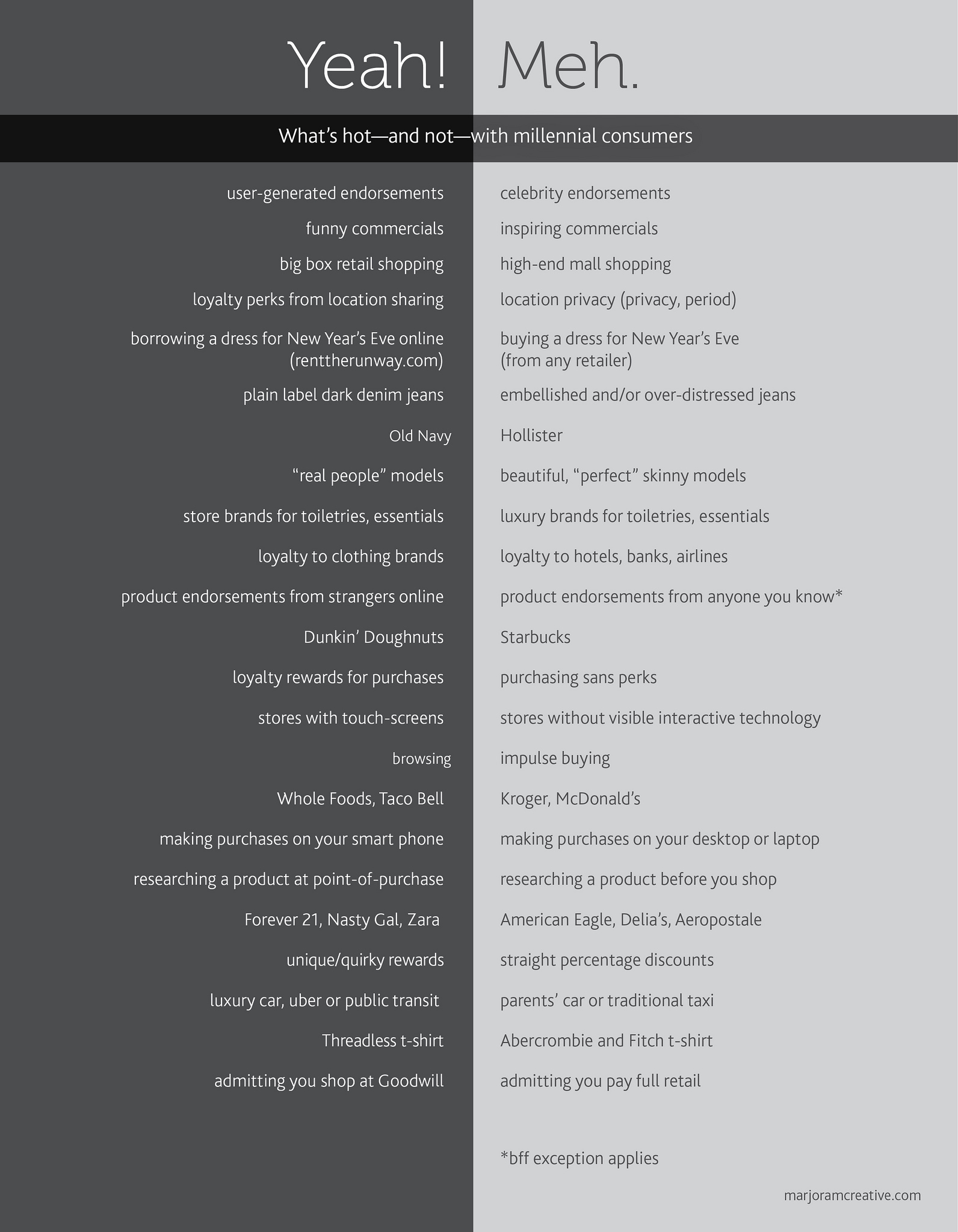Cracking the Trophy Kid Code
There is a statistic for everything you ever wanted to know about the coveted Millennial consumer. These 18-34 year olds were born into a technologically-fueled era that has resulted in the explosion of Big Data. Information about Millennials’ preferences, desires, habits and inclinations has been collected, analyzed and dissected in the quest to get inside their heads and into their pockets. (Use our “Yeah! Meh.” list for a peek inside the collective mind of this fickle faction. Just remember—this is a moving target.)
Who are these kids, anyway?
As compared to the Greatest, Boomer and X generations, they’ve been hovered over, indulged, coddled and protected. However, despite the best efforts of their helicopter parents, they’ve endured deeply unsettling events such as 9/11, multiple mass school shootings, and the Great Recession. Even as traditional adult milestones are delayed—a shocking 36% still live with their parents, though in their minds it’s not so much a setback as it is a practical use of resources—the world remains their oyster. By sheer force of numbers, they’ll soon be in charge, and they know it.
This curious mix of experiences has resulted in throngs of diverse, educated, self-assured, entitled young adults who have no doubt of their destiny—they deserve to get what they want. These brazen, demanding consumers are not easily won over, and they want so much. On top of carefully scrutinizing the quality of a product or service before they buy, they must be satisfied with the brand or company’s culture.
It’s no longer enough to make a great product.
Companies must now participate in societal and humanistic causes, be available across many media channels, provide stimulating environments for consumers as well as employees, and generally make people feel good and look smart for aligning with their brand. (And don’t forget, their “friends” have to like you, too.) But Millennials don’t like advertising and marketing, so brands will have to find another way—rather, several other, less intrusive ways to reach this easily bored and easily offended bunch.
Companies able to win and keep these young adults will benefit from the accompanying social sharing and influence of the stickiest kind, as happy customers are a brand’s most passionate advocates. But beware—brands can just as easily end up on the wrong end of a social media backlash when a product or service doesn’t measure up to its promises. This effect is particularly true when they feel deceived, because authenticity is especially important to Millennials.
A few notable Millennials (Jennifer Fleiss, president and cofounder of Rent the Runway; Ryan Holmes, the CEO of HootSuite; Mark Zuckerberg, CEO of Facebook; Alexa Von Tobel, Founder and CEO of LearnVest.com; Kevin Systrom, Founder of Instagram; Kathryn Minshew, CEO and co-founder of The Muse; David Karp, CEO of Tumblr; Dom Hofmann, Rus Yusupov and Colin Kroll, Founders of Vine; Brian Chesky, CEO and co-founder of Airbnb; Sophia Amoruso, Founder of Nasty Gal) have started companies and marketed them almost exclusively via social media, helping to shape a new blueprint that other businesses can learn from. Some older companies are embracing new ways of using technology and social media to interact directly with consumers to add new revenue streams. Others see that time is running out and are scrambling to incorporate an interactive strategy into their marketing plan. More than a few stubborn business owners and CEOs have convinced themselves their customers are traditional and they don’t need to change course…maybe their kids will inherit the business before it’s too late!
Assuming you’re not in the last category, check out our “Yeah! and Meh.” list for a code-cracking cheat sheet to the Millennial psyche, circa 2015.



